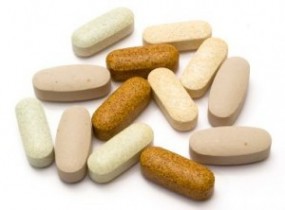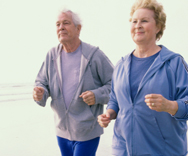- Fitness (19)
- News & Reviews (25)
- Nutrition (20)
- Science (10)
- Supplements (6)
- Technologies (8)
- The Arts (9)
The Multivitamin Maelstrom
November 7th, 2011
 By Cathie Dunal, MD, MPH: The media’s most recent — and unsubstantiated — medical claim comes from the Iowa Health Study in an article in the Annals of Internal Medicine: researchers state that mortality rates increase in older women who take daily multivitamin and mineral supplements. This claim has circled throughout the major media carriers, even landing in the Chicago Tribune, “…older women who took a daily vitamin supplement — even just a multivitamin — had an increased risk of dying of cardiovascular disease and cancer.” Look thoroughly at the research before you throw away your vitamins!
By Cathie Dunal, MD, MPH: The media’s most recent — and unsubstantiated — medical claim comes from the Iowa Health Study in an article in the Annals of Internal Medicine: researchers state that mortality rates increase in older women who take daily multivitamin and mineral supplements. This claim has circled throughout the major media carriers, even landing in the Chicago Tribune, “…older women who took a daily vitamin supplement — even just a multivitamin — had an increased risk of dying of cardiovascular disease and cancer.” Look thoroughly at the research before you throw away your vitamins!
A closer look shows that the Iowa Health Study article is not the rigorous, randomized study that is the gold standard in medical research; instead, it is simply observational. Women (average age: 61.6) self-reported their health status in 1986, 1997 and 2004. Finally, in 2008, after twenty-two years and only three checks, researchers tallied the number of women who had passed away due to cardiovascular disease, cancer or “other causes”.
Clearly the structure of the study wasn’t optimal, and furthermore, the study simply ignored the baseline health levels of the respondents. (Were they all basically healthy? Did any of the respondents have high blood pressure? How high? A family history of heart disease? Were they big fast food eaters?) We can’t accurately determine the respondents’ baseline health levels — and that, in a nutshell, is one of the major reasons the study is flawed.
As well, we have to address the supplements themselves: Were they of a high quality? Were the women taking supplements to cure an existing complaint, or taking them preventively to maintain optimal health levels? The study found that participants who took iron had the greatest mortality rate — and this finding, I argue, raises just these questions.
If we momentarily backtrack to the Seventies — remembering that the average age of the participants was over sixty at the beginning of the study — we’ll remember that media outlets had been saturated with Geritol® commercials promising to fix “iron-poor blood” or “tired blood”. Iron was marketed as a cure for tiredness, and Geritol® was the largest selling iron and B vitamin supplement in the US until 1979. I suspect that a significant number of the respondents who took iron were self-medicating tiredness — or other symptoms that could very well have been caused by underlying medical conditions. As the study fails to provide contextual information regarding the rationale behind supplement-taking, it becomes almost impossible to accurately analyze the study’s claims.
And finally, the findings in the Iowa Health Study are contradicted by a wealth of other research. Literally the next day after the Iowa Health Study was published, a summary article appeared in the Harvard Health Newsletter reporting better health with folic acid supplements and Vitamins B6 and B12. Quite contradictory.
The bottom line: this is a flawed study that has been overblown by the media. It will be interesting to see more research on the topic, as it is clearly a hot-button issue in the medical community. Meanwhile, I’m still taking my vitamins!
What ‘They’ Said
October 25th, 2011

More at ‘The Week’
Little Bit of Exercise, Big Benefits
October 6th, 2011
 ScienceDaily: A new University of Colorado Boulder study shows that a small amount of physical exercise could profoundly protect the elderly from long-term memory loss that can happen suddenly following infection, illnesses or injury in old age.
ScienceDaily: A new University of Colorado Boulder study shows that a small amount of physical exercise could profoundly protect the elderly from long-term memory loss that can happen suddenly following infection, illnesses or injury in old age.
In the study, CU-Boulder Research Associate Ruth Barrientos and her colleagues showed that aging rats that ran just over half a kilometer each week were protected against infection-induced memory loss.
“Our research shows that a small amount of physical exercise by late middle-aged rats profoundly protects against exaggerated inflammation in the brain and long-lasting memory impairments that follow a serious bacterial infection,” said Barrientos of the psychology and neuroscience department.
“Strikingly, this small amount of running was sufficient to confer robust benefits for those that ran over those that did not run,” Barrientos said. “This is an important finding because those of advanced age are more vulnerable to memory impairments following immune challenges such as bacterial infections or surgery. With baby boomers currently at retirement age, the risk of diminished memory function in this population is of great concern. Thus, effective noninvasive therapies are of substantial clinical value.”
Filed under Fitness | Comments Off on Little Bit of Exercise, Big BenefitsKids and Glasses
September 27th, 2011
 From ScienceDaily: Young children tend to think that other kids with glasses look smarter than kids who don’t wear glasses, according to a new study.
From ScienceDaily: Young children tend to think that other kids with glasses look smarter than kids who don’t wear glasses, according to a new study.
Children between the ages of 6 and 10 who were surveyed for the study also thought that kids wearing glasses looked more honest than children who don’t wear glasses.
Otherwise, the survey suggested that children don’t tend to judge the attractiveness of their peers who wear glasses when asked about their appearance, potential as a playmate or likely athletic abilities.
The findings might give children some comfort when they are fitted with their first pair of eyeglasses, said lead study author Jeffrey Walline, assistant professor of optometry at Ohio State University.
“If the impression of looking smarter will appeal to a child, I would use that information and tell the child it is based on research,” Walline said. “Most kids getting glasses for the first time are sensitive about how they’re going to look. Some kids simply refuse to wear glasses because they think they’ll look ugly.”
Walline surveyed children in this age range because they are more likely to be prescribed eyeglasses than contact lenses.
Filed under News & Reviews | Comments Off on Kids and GlassesNutritionFacts.Org
August 29th, 2011
What’s better for you than green tea? Cold-steeped green tea! Here is great info about antioxidants in tea, and more:
There is much more research-based information on Dr. Michael Gregor’s comprehensive website: NutritionFacts.Org — Meet Dr. Gregor:
Lose weight sleeping, supress cancer growth, decrease inflamatory markers, destroy cholesterol, lower risk of heart attack — with these tasty snacks? Continue reading »
Filed under Nutrition | Comments Off on NutritionFacts.Org


































